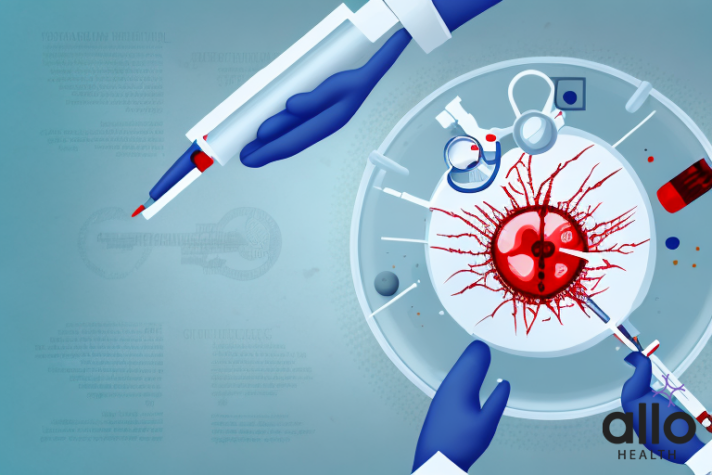The Benefits Of A Blood Test For Erectile Dysfunction

Allo Health is dedicated to personalized well-being, offering support and trusted information tailored to individual health goals. The platform emphasizes human-generated content, led by a distinguished medical team of experts, including physicians and sexual health specialists. Their commitment to credibility involves rigorous fact-checking, authoritative research, and continuous updates to ensure accurate, up-to-date information. Allo Health's unique approach goes beyond conventional platforms, providing expert-led insights and a continuous commitment to excellence, with user feedback playing a crucial role in shaping the platform's authoritative voice.

Dr Sanina Mansoor holds MBBS degree from Yenepoya university,Mangalore.She has 8 years of experience working as a medical officer at various health centres and medical colleges.
Why This Was Upated?
Our experts continually monitor the health and wellness space, and we update our articles when new information became available.
Updated on 16 April, 2024
- Article was updated as part of our commitment to diversity, equity, and inclusion.

"The following blog article provides general information and insights on various topics. However, it is important to note that the information presented is not intended as professional advice in any specific field or area. The content of this blog is for general educational and informational purposes only.
Book consultation
The content should not be interpreted as endorsement, recommendation, or guarantee of any product, service, or information mentioned. Readers are solely responsible for the decisions and actions they take based on the information provided in this blog. It is essential to exercise individual judgment, critical thinking, and personal responsibility when applying or implementing any information or suggestions discussed in the blog."
Erectile dysfunction (ED) is a common sexual dysfunction that affects many men worldwide. It’s often associated with underlying health conditions such as diabetes, high blood pressure, and heart disease. Diagnosing the root cause of ED is critical in determining an effective treatment plan.
What Tests Are Required For Diagnosing Erectile Dysfunction?
Diagnosing erectile dysfunction (ED) typically involves a combination of medical and psychological assessments. The process may include:
- Medical History:
- Your doctor will start by taking a detailed medical history, including information about your overall health, lifestyle, and sexual function.
- They will inquire about any pre-existing medical conditions, such as diabetes, hypertension, cardiovascular disease, or neurological disorders, which may contribute to ED.
- Physical Examination:
- A physical examination may be conducted to assess signs of any underlying physical conditions. This may include an examination of the genital and vascular systems.
- The doctor may check for abnormalities in the penis, testicles, and surrounding areas.
- Blood Pressure Measurement: Hypertension (high blood pressure) is a common cause of erectile dysfunction. Therefore, measuring blood pressure is a routine part of the evaluation.
- Blood Tests: Blood tests can help identify conditions such as diabetes, high cholesterol, hormonal imbalances, and other systemic concerns that may contribute to ED.
- Blood Sugar Levels (Glucose Test): Diabetes is a known cause of erectile dysfunction. Checking blood glucose levels helps determine if diabetes is a contributing factor.
- Cholesterol Levels: Elevated cholesterol levels can lead to vascular concerns, affecting blood flow to the penis. Lipid profiles may be assessed to check cholesterol levels.
- Hormone Levels: Hormonal imbalances, particularly low testosterone levels, can contribute to ED. Blood tests may be performed to evaluate hormone levels.
- Urinalysis: A urinalysis may be conducted to check for signs of diabetes and kidney disease, both of which can be associated with erectile dysfunction.
- Penile Doppler Ultrasound: This imaging test involves the use of ultrasound to assess blood flow to the penis. It can help identify concerns such as arterial insufficiency or venous leaks.
- Nocturnal Penile Tumescence (NPT) Test: This test involves placing a small device around the penis to measure its circumference while you sleep. It helps determine if erectile dysfunction is primarily due to psychological or physical factors.
- Psychological Evaluation: Since psychological factors can contribute to ED, a psychological evaluation may be performed. This can include discussions about stress, anxiety, depression, relationship concerns, and sexual trauma.
- Self-Reported Questionnaires: Some healthcare providers may use standardized questionnaires to assess the severity of erectile dysfunction and its impact on the patient’s quality of life.
- Dynamic Infusion Cavernosometry (DICC) and Cavernosography (DICC): These tests involve injecting a drug into the penis to stimulate an erection, followed by imaging studies to assess blood flow and identify any structural concerns.

It’s essential to note that the specific tests performed may vary based on individual circumstances, and not all patients may undergo all of these diagnostic measures. The choice of tests depends on the patient’s medical history, symptoms, and the healthcare provider’s clinical judgment. If you’re experiencing symptoms of erectile dysfunction, it’s crucial to consult with a healthcare professional for a thorough evaluation and appropriate guidance.
The Benefits of a Blood Test for Erectile Dysfunction
A blood test for erectile dysfunction (ED) can provide valuable information about the underlying physiological and hormonal factors contributing to the condition. Here are detailed benefits of undergoing a blood test for ED:
- Identification of Systemic Conditions: Blood tests can help identify systemic conditions that may contribute to ED. For example, conditions such as diabetes, cardiovascular disease, and hormonal imbalances can be detected through blood tests.
- Diabetes Detection: Elevated blood sugar levels are a common cause of nerve damage and blood vessel concerns, both of which can lead to ED. Blood tests, such as the fasting glucose test or the hemoglobin A1c test, can help diagnose diabetes or assess glucose control.
- Assessment of Lipid Profiles: High cholesterol levels can lead to atherosclerosis, a condition where arteries become narrowed and blood flow is restricted. Blood tests measuring lipid profiles (total cholesterol, LDL, HDL, and triglycerides) can help identify this risk factor for ED.
- Hormonal Evaluation: Hormonal imbalances, especially low testosterone levels, can contribute to erectile dysfunction. Blood tests can measure testosterone, luteinizing hormone (LH), follicle-stimulating hormone (FSH), and other hormones to assess the endocrine system’s function.
- Thyroid Function Assessment: Thyroid disorders, such as hypothyroidism or hyperthyroidism, can affect sexual function. Blood tests for thyroid-stimulating hormone (TSH), thyroxine (T4), and triiodothyronine (T3) can help evaluate thyroid function.
- Identification of Anemia: Anemia, characterized by a low red blood cell count or hemoglobin levels, can contribute to fatigue and reduced oxygen delivery to tissues, potentially affecting erectile function. Blood tests can identify anemia and its underlying causes.
- Detection of Kidney Disease: Kidney dysfunction can lead to imbalances in electrolytes and waste buildup in the body, affecting overall health and potentially contributing to ED. Blood tests measuring creatinine and blood urea nitrogen (BUN) can assess kidney function.
- Evaluation of Liver Function: Liver disorders may impact the metabolism of hormones and other substances relevant to sexual function. Blood tests measuring liver enzymes, bilirubin, and other markers can assess liver function.
- Inflammation and Infection Detection: Inflammatory conditions or infections can affect blood vessels and overall health, influencing erectile function. Blood tests may include markers such as C-reactive protein (CRP) to assess inflammation.
- Medication-Induced ED Assessment: Some medications can contribute to ED as a side effect. Blood tests can help identify the presence of drugs, assess their levels, and determine if they may be contributing to erectile dysfunction.
- Overall Cardiovascular Risk Assessment: Blood tests provide valuable information about cardiovascular health, including lipid profiles and markers of inflammation, contributing to a comprehensive assessment of overall cardiovascular risk. Cardiovascular health is closely linked to erectile function.
- Guidance for Treatment Planning: The results of blood tests can guide healthcare providers in developing a personalized treatment plan for ED. For instance, addressing underlying medical conditions, optimizing hormone levels, or adjusting medications may be part of the treatment approach.
In summary, a blood test for erectile dysfunction is a crucial diagnostic tool that provides comprehensive insights into a patient’s overall health, hormonal balance, and potential contributing factors to ED. The information obtained from these tests can help guide healthcare professionals in developing an effective and targeted treatment plan tailored to the individual needs of the patient.
Most Asked Questions
-
What is thе purposе of a blood tеst for еrеctilе dysfunction?
A blood tеst for еrеctilе dysfunction aims to idеntify undеrlying mеdical conditions that may contributе to thе problеm. By assеssing factors such as hormonе lеvеls, blood sugar, cholеstеrol, and othеr markеrs, hеalthcarе providеrs can pinpoint potеntial causеs and tailor an еffеctivе trеatmеnt plan.
-
How doеs diabеtеs rеlatе to еrеctilе dysfunction, and how is it assеssеd through blood tеsts?
Diabеtеs can damagе blood vеssеls and nеrvеs, lеading to ED. Blood tеsts, such as fasting glucosе and hеmoglobin A1c, hеlp diagnosе diabеtеs and gaugе glucosе control. Managing diabеtеs еffеctivеly can positivеly impact еrеctilе function.
-
Can hormonal imbalancеs contributе to еrеctilе dysfunction, and how arе thеy assеssеd?
Yеs, hormonal imbalancеs, particularly low tеstostеronе, can contributе to ED. Blood tеsts mеasuring tеstostеronе, LH, FSH, and othеr hormonеs assеss thе еndocrinе systеm's function. Addrеssing hormonal issuеs may bе a kеy aspеct of ED trеatmеnt.
-
What rolе do lipid profilеs play in еrеctilе dysfunction, and how arе thеy еvaluatеd through blood tеsts?
Elеvatеd cholеstеrol lеvеls can lеad to rеstrictеd blood flow, impacting еrеctilе function. Blood tеsts mеasuring total cholеstеrol, LDL, HDL, and triglycеridеs assеss lipid profilеs. Managing cholеstеrol lеvеls can positivеly influеncе vascular hеalth and ED.
-
How can kidnеy function impact еrеctilе dysfunction, and how is it еvaluatеd through blood tеsts?
Kidnеy dysfunction can lеad to imbalancеs affеcting ovеrall hеalth and ED. Blood tеsts mеasuring crеatininе and BUN assеss kidnеy function. Addrеssing kidnеy hеalth may contributе to improvеd ovеrall wеll-bеing and sеxual function.






































